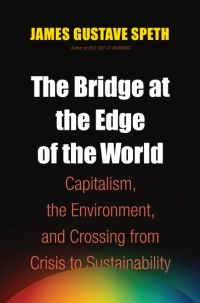The Bridge at the Edge of the World
Co-founder of the NRDC, Yale University dean, and former White House advisor James Gustave Speth has been a leader in the environmental movement for more than 30 years. Called “the ultimate insider” by TIME magazine, he has long worked through traditional channels to raise awareness of environmental issues.
But now, faced with overwhelming evidence of galloping degradation of the planet, Speth has concluded that the environmental project—his project—has failed. No matter how hard environmentalists work, the current of destruction against which they are swimming is simply too swift. In order to preserve a livable planet for future generations, Speth argues in The Bridge at the Edge of the World (Yale, March 28), the current itself must be altered. And the current is that untouchable edifice, American-style consumer capitalism.
Speth is no Marxist, and he’s not attacking capitalism in its ideal and theoretic form. But he’s marshaled formidable evidence that American-style consumer capitalism of the early twenty-first century is incompatible with maintaining quality of life for all of us. It is generating unprecedented environmental risks while failing to advance the happiness and social well-being of Americans, Speth argues. Our obsession with consumption and GDP growth has overshot its target and now causes more harm—to environment, social fabric, and world security—than good.
In a monumental work of synthesis, Speth proposes solutions large enough to make a difference. His view is a broad one that recognizes the connections between environmental issues and other issues of human welfare such as health, freedom, peace, stability, and community. “My point of departure is the momentous environmental challenge we face,” Speth says. “But today's environmental reality is linked powerfully with other realities, including growing social inequality and neglect and the erosion of democratic governance and popular control.” Speth shows how these seemingly separate areas of public concern are intertwined and calls upon citizens to mobilize spiritual and political resources for transformative change on all three fronts.
What kind of a system should follow our present, environmentally and socially destructive one? The Bridge at the Edge of the World lays the groundwork. Among the proposals Speth discusses in detail:
- We must change the very nature of corporations so they become legally accountable to society at large, not just to themselves and their shareholders.
- We must challenge the current obsession with GDP growth and focus on growth in the areas that truly enhance human well-being: growth in good jobs, in the availability of health care, in education, in the deployment of green technologies, in the incomes of the poor, in security against illness and disability, in infrastructure, and more.
- We must challenge materialism and consumerism as the source of happiness and seek new values about quality of life, social solidarity, and connectedness to nature.
- We must transform the market through government action so that it works for the environment, rather than against it.
- We must transform democracy through deep political reforms that reassert popular control, encouraging locally strong, deliberative democracy and limiting corporate influence.
- We must forge a new environmental politics that recognizes links among environmentalism, social liberalism, human and civil rights, the fight against poverty, and other issues.
Speth’s proposals demand a lot from world citizens and especially from Americans. At our current moment of economic insecurity, panic about the present could overwhelm even the most pressing concerns about the future. The knee-jerk scramble to fire up the stalling engines of economic growth leaves little room for big-picture assessment. Voices such as Speth’s that call for careful reconsideration of our assumptions are hard to hear.
Although our position is undeniably difficult, Speth finds hope in the very real interest of young people and many others in finding solutions, and in the rich ideas being generated by top thinkers devoted to the problem. Solutions that seemed foolish yesterday and that seem radical today will seem sensible and necessary tomorrow, he argues.
A catastrophe is coming if we stay on our current path, Speth warns. The Bridge at the Edge of the World provides a roadmap to lead us away from disaster toward a sustainable human future.
The Bridge at the Edge of the World, Yale University Press, New Haven/London 2008, 320 p.
Rezension: Ross Gelbspan, Washington Post, 27. April 2008 (www.washingtonpost.com)




